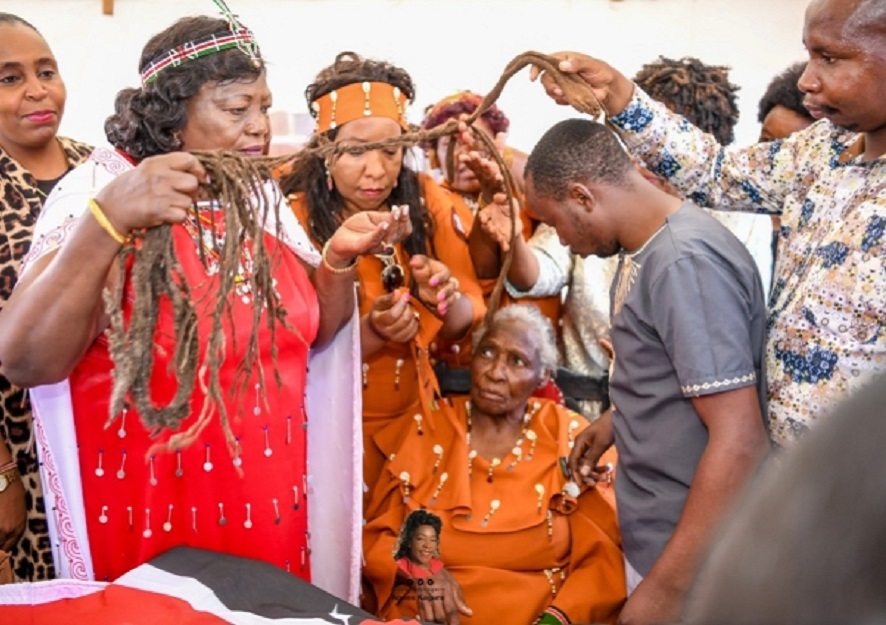In Kenya, the Mau Mau was a major nationalist revolutionary movement that originally sought to reclaim land that the British settlers had taken away from them in the 1950s. The group would eventually contribute to Kenya’s independence. Many studies have been carried out on the Mau Mau Movement, however, women’s leadership in the movement has often been overlooked.
When people speak of the Mau Mau freedom fighters who sacrificed a lot for their country, they usually only speak mostly of Mzee Kenyatta and Dedan Kimathi. They fail to recognize female freedom fighters like Muthoni wa Kirima who risked it all to save their country. Kirima was the only female Mau Mau Field Marshal. She earned the title after spending seven years in the forest during Kenya’s fight for independence.
She started her liberation fight as a spy, just like other women. They were responsible for providing supplies and intelligence to the Mau Mau fighters. This fight was not without personal sacrifices. Kirima was not only wounded twice in battle but she also had a miscarriage that left her unable to have children. Nevertheless, she has never regretted joining the Mau Mau.
Born in Central Province, Kenya, amid colonialism in 1931, she saw how her fellow native Africans suffered injustices. Without any formal education, Kirima, by age 20, had become a spy for the Mau Mau fighters who had camped in the forest in 1952. She joined the Mau Mau freedom struggle with her husband General Mutungi and entered the forests of Mt Kenya in the 1960s to fight. Her husband would die two years after the freedom struggle.
During the fight for freedom in the forests, Kirima wanted to do more than just spying and bringing food to the fighters. She wanted to fight so she spoke with Field Marshal Dedan Kimathi to allow her into the forest as a fighter and a soldier. Kimathi listened and allowed her in to fight. She proved to be a gallant soldier so she was promoted to Field Marshal, becoming the only woman to reach that position.
While fighting for freedom from the forest, Kirima also led the hunt for elephants and so when she and others came out of the forest after independence, she convinced authorities to grant her a license to trade in ivory, saying she knew where elephants tusks had been buried. But reports said her permission to collect and sell “wild” ivory ended in 1976 when officials banned the trade in ivory.
Kirima has since been fighting for a better life. The freedom fighter has been quite vocal about her disappointment with the post-colonial Kenyan governments and vowed never to chop off her dreadlocks until she sees the benefits of independence. So many reacted with shock on Saturday when the 92-year-old freedom fighter shaved her six-foot-long dreadlocks in a ceremony that was attended by former first lady Mama Ngina Kenyatta, who was her friend while she was in the forest fighting.
“Dreadlocks were the hairstyle that was associated with the Mau Mau while fighting in the forest as they barely had time to properly groom their hair, making it to lock,” said the former first lady, who shaved off Kirima’s hair.
Most of the Mau Mau freedom fighters cut off their hair immediately after coming out of the forest after Kenya gained independence. Historians said most of the fighters cut off their hair to signify freedom, saying that they had finally achieved what they wanted by defeating the colonizers. But Kirima decided to keep her dreadlocks as evidence of her role in the struggle for independence. She was also keeping them until her desires as a freedom fighter were met, as earlier stated.
On Saturday during the shaving ceremony, she said that she is cutting her hair because she has now achieved what she fought for. She didn’t give details, Kenyan media Nation reported.
“I have today agreed to shave my hair. This means that I’m contented that our country has had freedom at last. Generations are now free and what we fought for in the forest has finally been achieved,” Kirima said, according to Kenyan media K24 TV.
Some Kenyans are still disappointed that the hair has been shaved off, with others calling it a “political stunt”, according to the BBC. Kirima’s hair has since been wrapped in the Kenyan flag and is to be stored in a museum to signify its history, the former first lady said.










